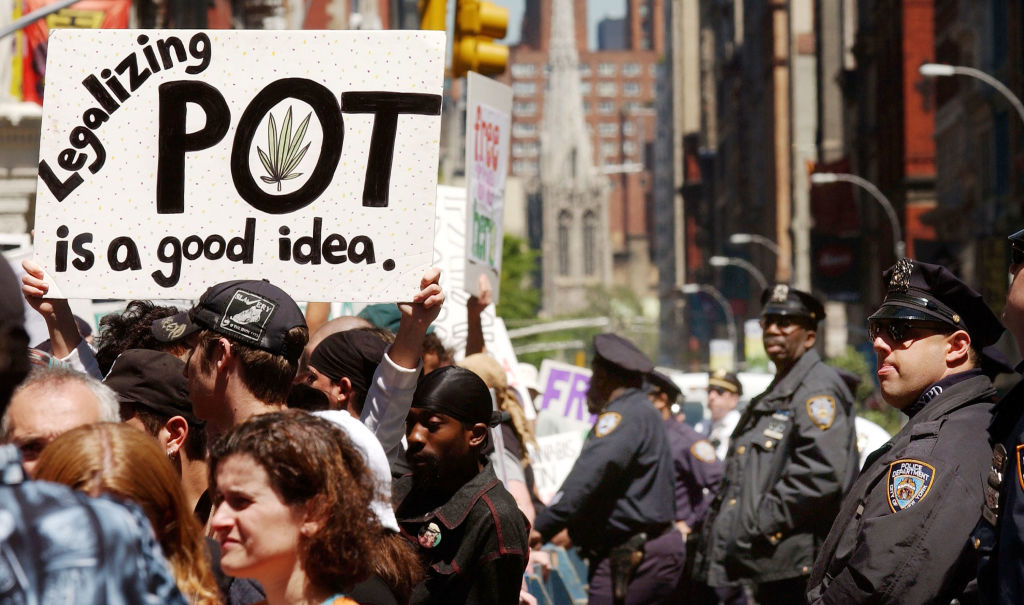New York lawmakers pass marijuana bill hailed as national model for socially equitable legalization


A free daily email with the biggest news stories of the day – and the best features from TheWeek.com
You are now subscribed
Your newsletter sign-up was successful
New York's legislature voted Tuesday to legalize recreational marijuana. After Gov. Andrew Cuomo (D) signs the package, which he said Tuesday will bring "justice for long-marginalized communities," New York will be the 15th state to allow pot use for non-medicinal purposes. The bill passed in the Assembly on a 43-20 vote and cleared the Senate 100 to 49. Democrats control both chambers.
The new law will allow anyone 21 or older to possess, carry, buy, or otherwise obtain up to three ounces of cannabis, probably starting in about a year, and it creates a regulatory framework for dispensaries to sell pot and certain businesses to allow its use. The new industry will be overseen by a new Office of Cannabis Management and a board appointed by the governor and lawmakers. Local municipal governments will be allowed to ban dispensaries and on-site use businesses, the Rochester Democrat and Chronicle reports.
The expected $350 million in annual tax revenue will be divided between schools (40 percent), drug treatment and education (20 percent), and a social equity fund (40 percent) designed to help New York avoid the situation in other legalization states where Black and brown dealers are excluded from the marketplace and pushed into the black market, NPR reports. That social equity pot will be invested in communities harmed by high rates of drug arrests, and dealers who can show their business would benefit those people and communities will be eligible for "social equity" dispensary licenses.
The Week
Escape your echo chamber. Get the facts behind the news, plus analysis from multiple perspectives.

Sign up for The Week's Free Newsletters
From our morning news briefing to a weekly Good News Newsletter, get the best of The Week delivered directly to your inbox.
From our morning news briefing to a weekly Good News Newsletter, get the best of The Week delivered directly to your inbox.
"I think it's just a real game-changer and sets a new model for what legalization should look like in this country," Melissa Moore, head of the Drug Policy Alliance's New York chapter, told NPR News.
A free daily email with the biggest news stories of the day – and the best features from TheWeek.com
Peter has worked as a news and culture writer and editor at The Week since the site's launch in 2008. He covers politics, world affairs, religion and cultural currents. His journalism career began as a copy editor at a financial newswire and has included editorial positions at The New York Times Magazine, Facts on File, and Oregon State University.
-
 Crisis in Cuba: a ‘golden opportunity’ for Washington?
Crisis in Cuba: a ‘golden opportunity’ for Washington?Talking Point The Trump administration is applying the pressure, and with Latin America swinging to the right, Havana is becoming more ‘politically isolated’
-
 5 thoroughly redacted cartoons about Pam Bondi protecting predators
5 thoroughly redacted cartoons about Pam Bondi protecting predatorsCartoons Artists take on the real victim, types of protection, and more
-
 Palestine Action and the trouble with defining terrorism
Palestine Action and the trouble with defining terrorismIn the Spotlight The issues with proscribing the group ‘became apparent as soon as the police began putting it into practice’
-
 TikTok secures deal to remain in US
TikTok secures deal to remain in USSpeed Read ByteDance will form a US version of the popular video-sharing platform
-
 Unemployment rate ticks up amid fall job losses
Unemployment rate ticks up amid fall job lossesSpeed Read Data released by the Commerce Department indicates ‘one of the weakest American labor markets in years’
-
 US mints final penny after 232-year run
US mints final penny after 232-year runSpeed Read Production of the one-cent coin has ended
-
 Warner Bros. explores sale amid Paramount bids
Warner Bros. explores sale amid Paramount bidsSpeed Read The media giant, home to HBO and DC Studios, has received interest from multiple buying parties
-
 Gold tops $4K per ounce, signaling financial unease
Gold tops $4K per ounce, signaling financial uneaseSpeed Read Investors are worried about President Donald Trump’s trade war
-
 Electronic Arts to go private in record $55B deal
Electronic Arts to go private in record $55B dealspeed read The video game giant is behind ‘The Sims’ and ‘Madden NFL’
-
 New York court tosses Trump's $500M fraud fine
New York court tosses Trump's $500M fraud fineSpeed Read A divided appeals court threw out a hefty penalty against President Trump for fraudulently inflating his wealth
-
 Trump said to seek government stake in Intel
Trump said to seek government stake in IntelSpeed Read The president and Intel CEO Lip-Bu Tan reportedly discussed the proposal at a recent meeting
